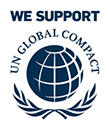Initiatives and Organizations
Major initiatives which we support and organizations which we belong to
United Nations Global Compact (UNGC)
The UNGC is a sustainability initiative that brings together the United Nations and the private sector (companies and organizations) to build a healthy global society.
Each company and organization acts as a good member of society by exercising responsible and creative leadership, and takes voluntary initiatives to achieve sustainable growth.
Signatory companies and organizations are required to continue their efforts to achieve ten principles in the areas of the protection of human rights, the elimination of unfair labor practices, environmental responsibility, and anti-corruption, based on the commitment of their top management themselves to these principles.

The Ten Principles of the UNGC
| Human Rights | Principle 1: Businesses should support and respect the protection of internationally proclaimed human rights; and Principle 2: make sure that they are not complicit in human rights abuses. |
|---|---|
| Labour | Principle 3: Businesses should uphold the freedom of association and the effective recognition of the right to collective bargaining; Principle 4: the elimination of all forms of forced and compulsory labour; Principle 5: the effective abolition of child labour; and Principle 6: the elimination of discrimination in respect of employment and occupation. |
| Environment | Principle 7: Businesses should support a precautionary approach to environmental challenges; Principle 8: undertake initiatives to promote greater environmental responsibility; and Principle 9: encourage the development and diffusion of environmentally friendly technologies. |
| Anti-Corruption | Principle 10: Businesses should work against corruption in all its forms, including extortion and bribery. |
Related links
- United Nations Global Compact (UNGC)
- News Release (October 26th, 2020) – Nippon Shokubai Signs United Nations Global Compact
- Sustainability Management
Task Force on Climate-Related Financial Disclosures (TCFD)
The TCFD is a task force established by the Financial Stability Board (FSB), an international organization of central banks and financial regulators from major countries and regions around the world.
It provides a framework for disclosing information on climate change-related risks and opportunities.

Related links
- Task Force on Climate-Related Financial Disclosures (TCFD)
- News Release (March 30th, 2021) – Nippon Shokubai to Support the Recommendations of the Task Force on Climate-related Financial Disclosures (TCFD)
- Tackling Climate Change
- TCFD Reports
The GX League
The GX League (GX: green transformation) is a forum for cooperation between a group of companies and the government, universities, and academic institutions in order to meet greenhouse gas reduction targets and increase industrial competitiveness by using Japan’s goal of carbon neutrality by 2050 as an opportunity for economic growth.

Related links
Responsible Care Global Charter
Responsible Care (RC) is an activity in which companies handling chemical substances engage in dialogue and communication with society by voluntarily ensuring the environment, safety, and health in all processes from development, manufacturing, distribution, use, and final consumption to disposal and recycling of chemical substances, and by disclosing the results of these activities.
The International Council of Chemical Associations (ICCA) published the Responsible Care Global Charter, which was revised in 2014 to promote activities internationally.

Related links
Japan Clean Ocean Material Alliance (CLOMA)
The CLOMA is a platform in Japan to accelerate innovation by strengthening collaboration among a wide range of stakeholders across industries to solve the global issue of marine plastic waste.

Related links
Long-range Research Initiative(LRI)
The LRI is an international initiative that provides long-term support for research on the effects of chemical substances on human health and the environment. The Japan Chemical Industry Association (JCIA) is promoting this initiative in Japan.
Related links
Keidanren Initiative for Biodiversity Conservation
This is an initiative by the Japan Business Federation (Keidanren) to “realize a sustainable society through building a society in harmony with nature”.
The initiative has seven action guidelines, including management responsibility, voluntary efforts, and partnership.
Related links
The 30by30 Alliance for Biodiversity
The 30by30 Alliance for Biodiversity is a voluntary alliance of industries, the private sector, and governments that aims to contribute to achieving the “30by30”, which effectively protect or conserve at least 30% of land and sea areas as healthy ecosystems by 2030.

Related links
“White Logistics” Movement
This is an initiative promoted by the Ministry of Land, Infrastructure, Transport and Tourism, and other ministries. This movement aims to ensure the stable logistics necessary for people’s daily lives and industrial activities as well as to contribute to the growth of the economy by improving productivity and logistics efficiency of truck transportation and achieving a “white” working environment for drivers and other workers.
Related links
Challenge Initiative for 30% of Executives to Be Women by 2030 – #Here We Go 203030 –
The initiative was announced by the Japan Business Federation (Keidanren) in 2021.
The initiative aims to “increase the proportion of women on the board of directors to at least 30% by 2030” and is working to “promote the active participation in the workforce by diverse people” in order to achieve inclusion and co-creation of diverse value that are the keys to sustainable capitalism.
Related links
EcoVadis
EcoVadis is an online platform for supply chain sustainability performance management operated by French company EcoVadis. The platform serves over 130,000 companies in some 180 countries.
Related links
Sedex
Sedex, a non-profit organization, operates an online platform for companies to store and view data on ethical and responsible business practices. The platform is adopted in 180 countries and regions across 35 industry sectors, including food, agriculture, financial services, clothing, garments, packaging, and chemicals.
Related links
Roundtable on Sustainable Palm Oil (RSPO)
The RSPO is a not-for-profit organization to promote the sustainable production and use of palm oil. It unites a wide range of stakeholders involved in palm oil and facilitates them working together to consider the impact of palm oil on the environment and human rights through two systems: certification of sustainable production and certification of systems for the proper distribution of certified palm oil.
Related links
Other major organizations which we belong to
- Japan Business Federation (Keidanren)
- Japan Chemical Industry Association (JCIA)
- Japan Petrochemical Industry Association (JPCA)
- Kansai Chemical Industry Association (Kankakyo)
- Battery Association for Supply Chain (BASC)
- Clean Fuel Ammonia Association (CFAA) etc.